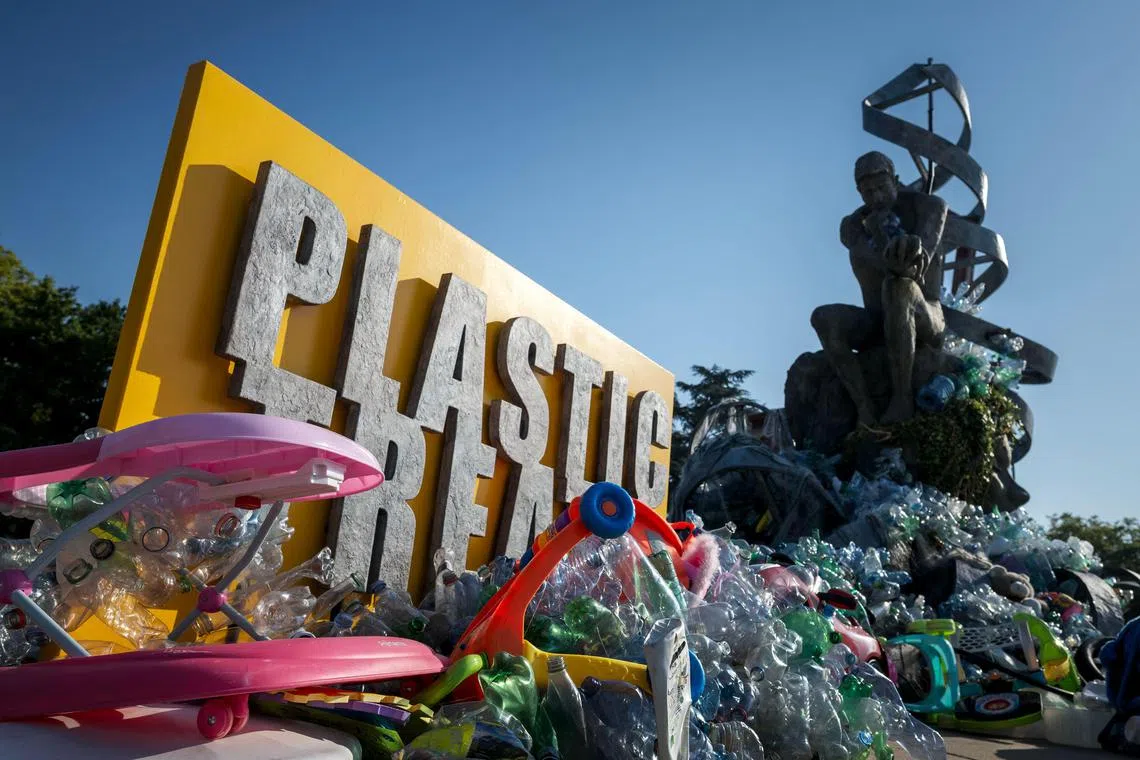News analysis
Plastics crisis grows as UN treaty talks end in failure
Sign up now: Get ST's newsletters delivered to your inbox

Failure to get a deal undermines the March 2022 decision by 175 nations to develop a legally binding global treaty to address the full life cycle of plastic.
PHOTO: AFP
SINGAPORE – The failure of UN talks in Geneva to seal a global plastics treaty on Aug 15 risks worsening a global environmental and human health crisis by further delaying production curbs that many nations and environmental groups say are urgently needed.
Much had been riding on the Geneva talks. There were hopes delegates would finally agree on a binding pact to tackle the growing amounts of plastic waste fouling rivers and oceans, as concerns grow over the health impacts of microplastic fragments that are now found in almost every part of the human body.
The talks went deep into overtime on Aug 15, the 12th day of negotiations, but delegates from more than 180 nations, including Singapore, could not resolve deep disagreements
The majority of nations – many from Europe, the Pacific, Africa, Asia and Latin America – backed treaty language on reducing plastic production, phasing out toxic chemicals used in plastics, and improving plastic product designs that boost recycling and cut waste.
But petrostates such as Saudi Arabia, Kuwait and Malaysia as well as major plastics producers wanted treaty language narrowly based on voluntary actions and a focus on waste management, observers said.
These nations see binding curbs on the production of virgin plastic as a threat to profits – about 98 per cent of plastics are made from fossil fuels. As consumers switch to electric vehicles and demand for oil falls, this group sees plastics as a growth area.
“The whole process is being led by a small group of countries that have the lowest ambition. And they have the veto power – any one country can just raise their hand and decline to agree on a decision that the others make,” surmised Mr Dharmesh Shah, senior consulting campaigner on the plastics treaty for the Centre for International Environmental Law (Ciel).
French Ecology Minister Agnes Pannier-Runacher said during the meeting’s closing session that she was “enraged, because despite genuine efforts by many, and real progress in discussions, no tangible results have been obtained”, Agence France-Presse reported.
Delegates and civil society groups said the frustration during the Geneva talks was palpable.
Failure to get a deal undermines the March 2022 decision by 175 nations to develop a legally binding global treaty to address the full life cycle of plastic, from production to disposal.
A spokesman for Singapore’s Ministry of Sustainability and the Environment told The Straits Times that the Republic had been an active and constructive player throughout the negotiations, to try to finalise a legally binding instrument to end plastic pollution, including in the marine environment.
“Our positions are underpinned by our national interest, taking into account the views of various stakeholders and broadly aligned with those taken by regional groups that we are members of, the Alliance of Small Island States and the Group of Asia Pacific States.”
What’s next?
The next steps are still unclear. The chair of the negotiations, Mr Luis Vayas Valdivieso from Ecuador, adjourned the session with a pledge to resume talks at an undetermined date.
The negotiations were meant to wrap up at the previous session in South Korea in late 2024, but failure there led the United Nations to schedule the Geneva round. A further session risks yet more deadlock, and there are calls to rethink how future negotiations might be conducted.
US resistance also derailed the process.
Ahead of the Geneva talks, the Trump administration sent letters to a number of countries, saying they must reject the goal of a global pact that includes limits on plastic production and plastic chemical additives, Reuters reported.
The hope had been that the Geneva talks could at least agree on the broad outlines of a treaty that could be strengthened over time. But that failed to materialise.
“If this process just drags on, the momentum, the political will, will start to decline and the urgency of the plastic pollution crisis won’t get the attention it deserves,” said Ms Zaynab Sadan, global plastics policy lead for conservation group World Wide Fund for Nature.
For now, there is strong support for a legally binding global treaty from more than 100 nations at the talks and business.
“The majority of countries actually want (a deal), not only to address plastic pollution, but to ensure that the ideals of multilateralism are actually upheld during this very polarised time,” Ms Zaynab told ST.
“This ambitious group can take matters into their own hands, take this outside of this process, and agree on a treaty that will be effective for the majority of countries that want to act now,” she added.
This has happened before, Ciel’s Mr Shah said, such as with the 1997 Ottawa landmines treaty and the 1971 Ramsar Convention on wetlands.
“But the best bet is to give this current process a fair chance, which is what everyone’s doing,” he added.
A grouping of more than 300 businesses from across the plastics industry, financial institutions and non-governmental organisations indicated that they also want clarity, as fragmented global action makes it harder to plan investments and navigate myriad national regulations on plastics.
“We stand ready to work with policymakers across the world in support of the globally harmonised regulations that business needs, and the majority of nations want,” the Business Coalition for a Global Plastics Treaty said in a statement.
Growing crisis
Plastics are one of humanity’s most useful inventions and are vital for medical devices, the aerospace and automotive sectors and food packaging.
But the rapid proliferation of single-use plastic, especially packaging, has led to unbridled growth and left most waste management systems unable to cope. Every year of delay on a global treaty adds to the vast amounts of plastic polluting the land and oceans, the UN and scientists say.
Plastics break down into smaller and smaller pieces as they degrade, and can be carried through the air and in water supplies. Creatures such as fish and prawns can mistakenly eat the tiny pieces of plastic, which may end up in the human body – including the brain – when such seafood is consumed.
“There’s a huge public health crisis here,” said Mr Shah.
Micro and nanoplastics are accumulating in the human body, studies show.
Toxic chemicals in plastics are also a growing concern.
A 2023 report by the UN Environment Programme (UNEP) estimated that 13,000 chemicals are used to make different kinds of plastic; 7,000 have hazard data, of which 3,200 are chemicals of concern. Some are known carcinogens.
An expert review of the risks from plastics published by The Lancet journal in early August 2025 said plastics are a grave, growing and under-recognised danger to human and planetary health.
Some of the risks mentioned include poisoning of workers during plastics production. There are also concerns about micro and nanoplastics in the human body and plastic chemicals used in food packaging.
Especially in poorer nations, burning plastics as fuel and a lack of protection during recycling raise health risks for workers.
“Plastics cause disease and death from infancy to old age, and are responsible for health-related economic losses exceeding US$1.5 trillion (S$1.92 trillion) annually,” the experts said.
UNEP says this is why focusing just on waste management and recycling is not the answer. The whole lifecycle of plastics needs to be tackled.
More than 400 million tonnes of plastic are produced annually, about half of which is used only once and then tossed.
Globally, less than 10 per cent of all plastic produced is recycled due in part to poor waste management in some countries, but also because recycled plastic materials are often more expensive than virgin plastic, and because some plastic products are not designed to be recycled.
Nearly half of all plastic ends up in landfills, while 17 per cent is incinerated and 22 per cent is mismanaged and becomes litter.
The Organisation for Economic Cooperation and Development (OECD) estimates that more than one million tonnes end up in the oceans each year. It says that on current trend, plastics will nearly triple by 2060 to 1.2 billion tonnes, while waste will exceed one billion tonnes.
South-east Asia and East Asia are on the front line.
In a July 2025 report, the OECD said the 10 Asean nations plus Japan, South Korea and China are central to global plastics value chains, with plastics use in the region surging almost ninefold from 17 million tonnes in 1990 to 152 million tonnes in 2022.
More than half of this was used in short-lived applications like packaging, and comprised nearly a third of global plastics use.
The region is also a hot spot for plastic pollution, driven by rising waste generation and insufficient – though improving – waste management, the OECD said.
In 2022, the 13 nations accounted for 8.4 million tonnes of plastic leakage to the environment, more than a third of the global total.
National actions
“The urgency of the plastic crisis is only going to grow. And the push for greater regulation of plastic production, product design and chemicals is only going to increase, regardless of whether we get a treaty or not,” Mr Shah said.
Nations are responding, taking their own steps to address the crisis, including improving waste management and scaling up recycling schemes.
Like many countries, Singapore has an extended producer responsibility mandate for key waste streams such as e-waste, making producers responsible for the end-of-life management of their products, indirectly encouraging more sustainable and recyclable product design.
The Republic will also roll out a beverage container return scheme for plastic and metal containers in 2026.
National measures are important. But a global set of rules will make it easier for countries and companies to speed up efforts to reduce the risks from plastics, while ensuring they can remain important tools for society.
“Globally coordinated action is certainly the fastest way,” said Mr Shah.



